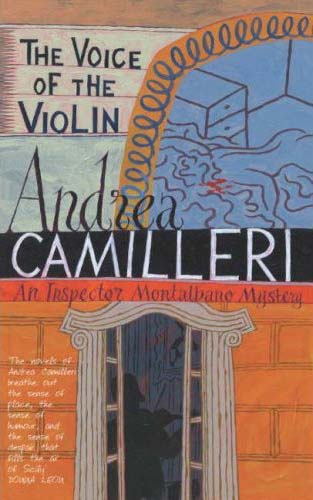
EURO CRIME
Reviews

Camilleri, Andrea - 'The Voice of the Violin' (translated by Stephen Sartarelli)
Paperback: 224 pages (Jan. 2006) Publisher: Picador ISBN: 0330492993
Chronologically the fourth outing for Inspector Salvo Montalbano and his Sicilian team of detectives, THE VOICE OF THE VIOLIN is a perfect example of all that is good about this series. The plot is one of the stronger, leaner ones, in which Salvo, through a colleague's bad driving, inadvertently discovers the body of a beautiful woman in a house which she was having built. As Salvo's boss and mentor has now retired, Salvo soon gets caught up in politics and taken off the case. To his annoyance, the flying squad sent to replace him quickly chase down a suspect (previously considered and discounted by Salvo) and kill him in a gun battle.
Or was it a gun battle? His suspicions aroused, and unable to throw off the need to discover who committed the crime, Salvo uses some devious tactics of his own to expose the fraudulent activities of his colleagues and to manoeuvre his superiors to reassign him to the case.
Salvo's gradual uncovering of the true story leading to the crime is logically satisfying, as well as introducing a rewarding set of characters among the witnesses and suspects. The role of the titular violin does not become obvious until later on in the book, but we know that there is going to be some later significance in Salvo's visit to his old friend Clementina. In this visit, she reveals that her upstairs neighbour is a reclusive, retired maestro violinist, who plays her concerts via programmes sent by his housekeeper, of which she shows her appreciation by phoning him afterwards and applauding by the open receiver.
Sure enough, the violin provides the key to the mystery, and Salvo eventually ensures that justice is done, even if it isn't clear how sufficient evidence can be gathered to charge or convict the perpetrator. The only slight false note is the McGuffin that isn't a McGuffin - throughout the book we are reminded that there is a car in the police garage that hasn't been investigated. So obviously so, in fact, that the reader concludes that the car can have nothing to do with the case. But why does the widower, then, keep asking for it, when he has no particular reason to do so? And, at the end, a discovery is made in the car which, if the detectives had only checked at the beginning, makes much of the investigation (and hence the bulk of the book) unnecessary.
Even so, it is a pleasure for its own sake to have the chance to join Salvo and his increasingly close-knit team (earlier rivalries and tensions are gradually being reduced or forgotten) and to experience his boyishly irascible ways. We also see plenty of his "mother's side", as he thinks of it - his sensitivity towards women (not only his girlfriend Livia, who here receives a crushing disappointment, but the murdered woman and her friend, Anna) and, last but by no means least, we can enjoy his visceral appreciation of those wonderful meals prepared by his housekeeper or at one of those trattorias that always seem to be on just the right corner when needed.
Maxine Clarke, England
November 2007
Details of the author's other books with links to reviews can be found on the Books page.
More European crime fiction reviews can be found on the Reviews page.